Over 60% of women and more than 10% of men will suffer from a Urinary Tract Infection (UTI) at some point in their lives. UTI’s cause pain, irritation and discomfort which can be particularly noticeable when going to the toilet. If you have a UTI then you will want to get rid of this annoying infection as quickly as possible. You will also want to do everything to prevent you from getting a Urinary Tract Infection again in the future. The good news is that there are ways to successfully get rid of UTI’s in addition to preventative measures which will make it less likely for you to suffer from this infection in the future.
UTI Causes
UTI’s are caused when bacteria enter the urinary tract. This bacterium enters the urinary tract via the urethra which is responsible for carrying urine out of the human body. There are a number of causes of bacteria entering the urinary tract, including sexual intercourse, not keeping genitals and the surrounding areas clean and dry, not drinking enough fluids, and not going to the toilet when you need to urinate or being unable to empty your bladder fully. Pregnant women and people with lower immunity are also more prone to Urinary Tract infections.
Why more women than men get UTI’s
Everyone, from young children to the elderly can get a UTI, and as we have already mentioned, females are a lot more likely than males to get this infection. As a result of women suffering more frequently from UTI’s, most of the research carried out into this infection centres around females opposed to males. As a result, you will also find that more products and prevention methods are aimed at the female population.
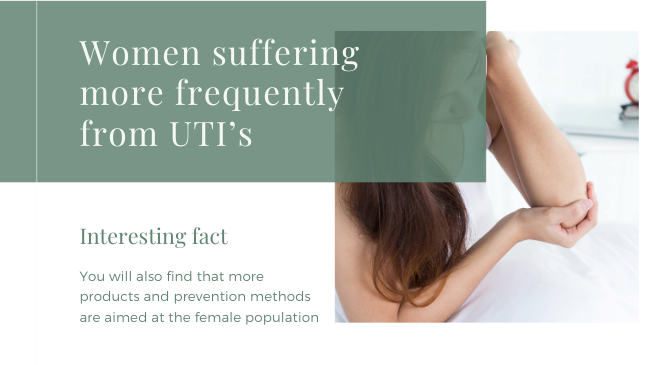
UTI’s in Women
One of the main reasons for this is the length and position of the urethra within the female body. Women have a shorter urethra than men, and it is positioned closer to the anus, the part of the body which stool comes out of. A woman’s urethra is also closer to the vagina. Infection is therefore more likely to occur in women because bacteria from the anus contained in stool (poo) can enter the urinary tract more easily.
Research has shown that some women are at higher risk than others of getting a UTI and these include:
- Pregnant women as pregnancy applies a greater amount of pressure on the Urinary Tract.
- Post-Menopausal women as this can lead to the depletion of hormones protecting the vagina.
- Women with a condition which makes it more difficult to fully empty the bladder including pelvic organ prolapse
- Women using certain types of birth control like diaphragms and spermicide.
- Those with diabetes
- Women with lower immunity
- Women who have suffered a spinal cord injury as this can make it difficult to fully empty the bladder
UTI’s in Men
As a result of the male urethral opening being at the end of the penis and therefore further away from the bladder, men are less likely than women to get UTI’s. Males still get UTI’s, however, and certain men are more likely to suffer than others, including:
- Men who regularly get kidney stones
- Males with an enlarged prostate
- Diabetic men
- Those who participate in anal intercourse without the use of a condom
- Men with a weakened immune system
- Uncircumcised men
- Men who find it difficult to completely empty their bladder including those with spinal cord injuries.
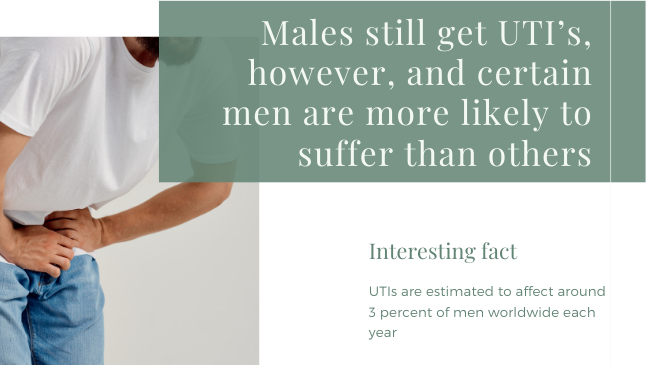
Types of Urinary Tract Infections & UTI Symptoms
The Urinary Tract, which is also known as the urinary system or renal system, contains the urethra, bladder, kidneys and ureters. A UTI can affect a specific part of the urinary tract and depending upon where in the urinary tract the infection takes place the causes and symptoms can be different. Below we look at the differences in these infections as well as the specific causes:
Cystitis
A common type of UTI is cystitis which occurs in the bladder and is sometimes also referred to as a bladder infection or water infection. Like with many types of UTI’s, cystitis is a lot more common in women than it is in men. As a result of the female urethra being short and close to the anus it makes it easier for bacteria to enter the urinary tract and therefore cause cystitis.
Cystitis Causes
Women will sometimes get a bladder infection after sexual intercourse. Another cause of cystitis in women is wiping the bottom area from the back to the front. Other potential causes of cystitis are having a urinary catheter inserted and also using a diaphragm for contraception. Furthermore, friction from sex and certain types of chemicals within bubble baths and soap may also cause cystitis in women.
Cystitis Symptoms
There are a range of symptoms linked with cystitis in adults including:
- A burning sensation, stinging and pain when you are peeing.
- A sense that you need to pee again straight after going to the toilet
- Needing to go to the toilet on a more regular basis and urgently
- Dark, cloudy urine with a strong smell
- A painful tummy, particularly in the lower part
- Feeling sick, tired and generally unwell and also getting aches and pains.
- Noticing blood in your urine
The symptoms for cystitis in children may include a high temperature of 38C or above. Other symptoms include tiredness and weakness, becoming irritable, not feeling like eating and generally having a reduction in appetite and vomiting.
Kidney Infection
Another part of the Urinary Tract which can become infected are the kidneys. A kidney infection usually occurs through cystitis when bacteria travel up through to the bladder into the kidneys. The majority of people who get cystitis will not get a kidney infection, but it is always important to try and treat cystitis straight away when you notice symptoms. If you do get a kidney infection, then it is especially important to seek treatment and help because if it is left untreated then this can cause permanent damage to the kidneys. If you, however, treat kidney infections in plenty of time then they will not cause any long-term harm.
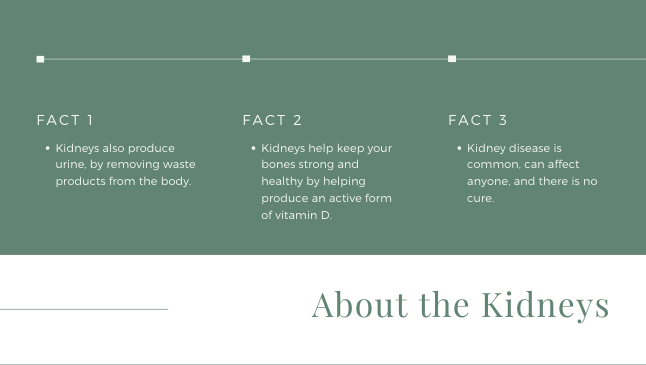
Kidney Infection Symptoms
If you have a kidney infection, also known as acute pyelonephritis, then you might have the following symptoms:
- Pain in your upper back and side (flank)
- Shivery chills and shaking
- A high temperature or fever
- Nausea and Vomiting
Urethritis
Urethritis is inflammation of the urethra which sits at the bottom of the urinary tract. The urethra is a type of tube which transports urine from the bladder to outside the body. Urethritis can be caused by sexual activity and bacteria entering the urinary tract.
Urethritis Symptoms
If you have urethritis, then you may have the following symptoms:
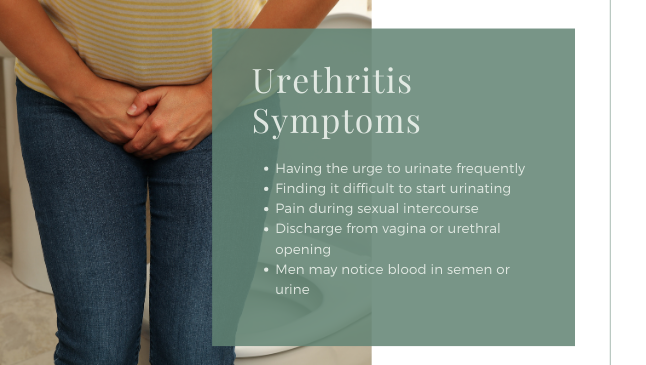
How to Treat Urinary Tract Infections
Firstly, if you have any of the symptoms mentioned above then you should see a doctor who will determine whether you have a Urinary Tract Infection or not. It is important that you begin treatment for a UTI like cystitis straight away before it develops into a more serious problem such as a kidney infection. Due to the uncomfortable and painful symptoms associated with UTI’s you will also be keen to get rid of this infection quickly because it can also affect your sleep and sex life.
Getting Rid of a UTI Quickly
If you have a UTI, you have a range of options when it comes to getting rid of it. People choose both synthetic and natural treatments for relieving the symptoms and getting rid of urinary tract infections.
Antibiotics
If you have been informed by your doctor that you have a Urinary Tract Infection, then there is a good chance that they will prescribe you with Antibiotics. Antibiotics offer a quick and effective way of getting rid of UTI’s. They work by killing the bacteria that is causing the infection. Antibiotics are often seen as the obvious option for UTI’s but they are not always the best choice.

Bacteria Becomes Resistant to Antibiotics
One of the major disadvantages of using antibiotics, particularly on a regular basis is that the bacteria they are meant to destroy becomes resistant to the effectiveness of antibiotics over time. Research has shown that certain strands of bacteria including E. coli, the cause of most bladder infections, are showing an increasing resistance to antibiotics. This means that antibiotics are proving less effective in the treatment of Urinary Tract Infections. Doctors are therefore now more reluctant to prescribe antibiotics to those suffering from UTI’s. Another potential negative effect of antibiotics is that they may also damage good bacteria within the human body which could make you more prone to other infections.
Natural Alternatives to Antibiotics for UTI’s
As a result of antibiotics proving less effective in the treatment of UTI’s including cystitis, there has been an increasing emphasis on natural alternatives. Natural UTI treatments are seen as a safe, effective and long-term alternative to antibiotics. There are also occasions in which antibiotics are not necessary in the treatment of UTI’s, particularly in relation to minor, uncomplicated varieties.
D-mannose
D-mannose is a natural sugar which is found in fruit like cranberries. It is also produced, in very small quantities, by the human body. D-mannose is the Monosaccharide Isomer of Glucose which essentially means it is a close relation of glucose. It is referred to as a simple sugar, meaning D-mannose contains just one, singular molecule of sugar. It has a white colour and slightly sweetened taste. In recent years, D-mannose has grown in popularity due to its use in the treatment of UTI’s and bladder infections (cystitis) in particular.
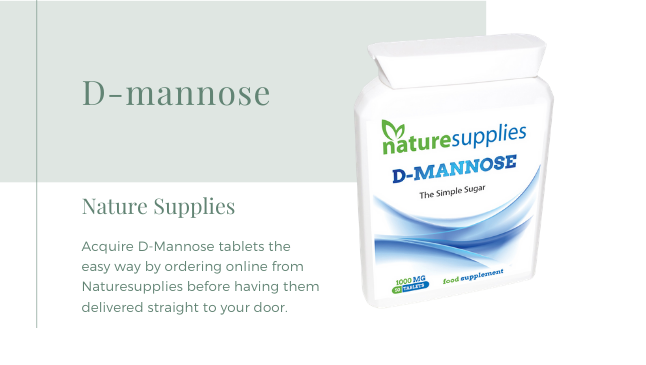
How does D-mannose work?
Research has been carried out to establish why D-mannose has proven effective in getting rid of UTI’s quickly. It is believed that once E. Coli bacteria enters the urinary tract it attaches itself to cells within the bladder and causes further infections. Research suggests that D-mannose stops the E. Coli from latching on to cells and helps to eradicate the E. Coli bacteria through urination. It is therefore considered to offer safe, quick and effective relief from cystitis and bladder infections.
D-mannose for UTI’s
If you are looking to get rid of your UTI quickly and effectively in a natural way, there are plenty of D-mannose products available on the market for you to choose from. You can buy D-mannose powder which can simply be added to a glass of water before being consumed. The powder dissolves quickly in the water and is the preferred choice among people who either don’t like taking tablets or struggle to swallow them. If you would prefer tablets, there are also a vast array of different products available including coated varieties. You can buy D-mannose from reputable online natural supplement providers.
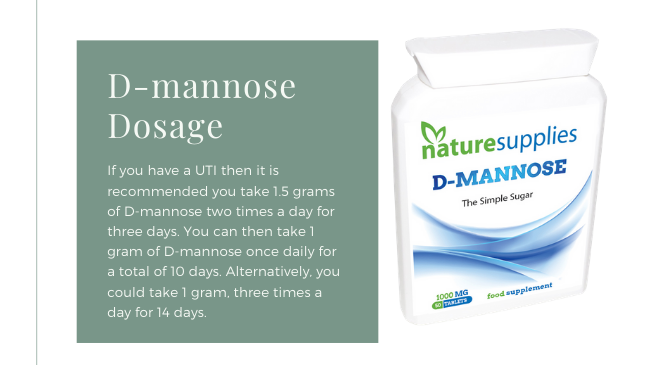
D-mannose Side Effects
The majority of people who take D-mannose do not report any side-effects. The side-effects which have been reported are not severe and include loose stools and diarrhoea.
Cranberry
Like D-mannose, cranberry is another natural option in the treatment of UTI’s. Cranberries are a red fruit which grow on a species of evergreen dwarf shrubs. For many years, cranberry has been considered as a possible treatment for urinary tract infections. People with UTI’s have therefore chosen to drink cranberry juice and cranberry supplements with the aim of relieving the symptoms and eradicating the bacterial infection.

How to Prevent UTI’s
If you have had a UTI in the past, then you will be fully aware of the discomfort and pain this can cause and will be keen to prevent infections in the future. There are various ways in which you can help to prevent a UTI, including some everyday activities and habits:
Drink Plenty of Water
Drinking more water will result in you urinating on a more regular basis. During urination, bacteria in the urinary tract is flushed out and this can help to prevent infections from starting in the first place.
D-mannose Supplements
D-mannose is a natural supplement and unlike antibiotics, its effectiveness does not diminish over time. D-mannose is safe to take on a regular basis and if you have a history of UTI’s then taking 2 grams once a day could prove to be an effective preventative measure.
Cranberry Juice and Supplements
It is not harmful to drink cranberry juice or take cranberry-based supplements on a regular basis, so it therefore offers another safe, preventative option if you have suffered from UTI’s in the past.
Females should Wipe from Front to Back
After going to the toilet, females should wipe from front to back as this will prevent bacteria from the anal region from entering the vagina and urinary tract via the urethra.
Empty your Bladder after Sex
This will help to flush out any bacteria which has entered your urinary tract during intercourse. It is also recommended that you drink a glass of water after sex too.
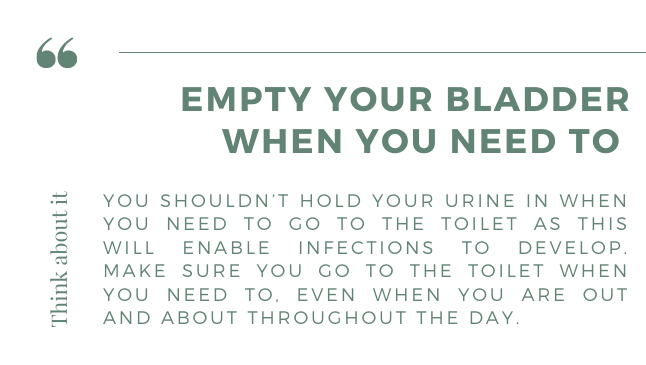
Avoid Potentially Irritating Feminine Products
From powders to shower gels, soaps and bath salts, there are a range of products which could potentially irritate the urethra and cause an infection. Fragranced products can be a particular problem in this instance.
Change Birth Control Methods
A range of contraceptive methods and products may lead to bacterial growth and UTI’s, including diaphragms and unlubricated and spermicide-treated condoms.
UTI Summary
There are various types of UTI’s with the most common variety being cystitis which is a bladder infection affecting more women than men. Antibiotics are often prescribed for Urinary Tract Infections but are not always necessary. The bacteria causing the infection can become resilient to antibiotic treatment over time. Many people across the world are therefore turning to natural UTI treatment and prevention methods including D-mannose and Cranberry. If you have a bladder infection then it is recommended that you look take action to eradicate this quickly before the infection spreads to other parts of the urinary tract including the kidneys.
Sources
https://www.nhs.uk/conditions/urinary-tract-infections-utis/
https://www.mayoclinic.org/diseases-conditions/urinary-tract-infection/symptoms-causes/syc-20353447
https://www.healthline.com/health/d-mannose-for-uti
